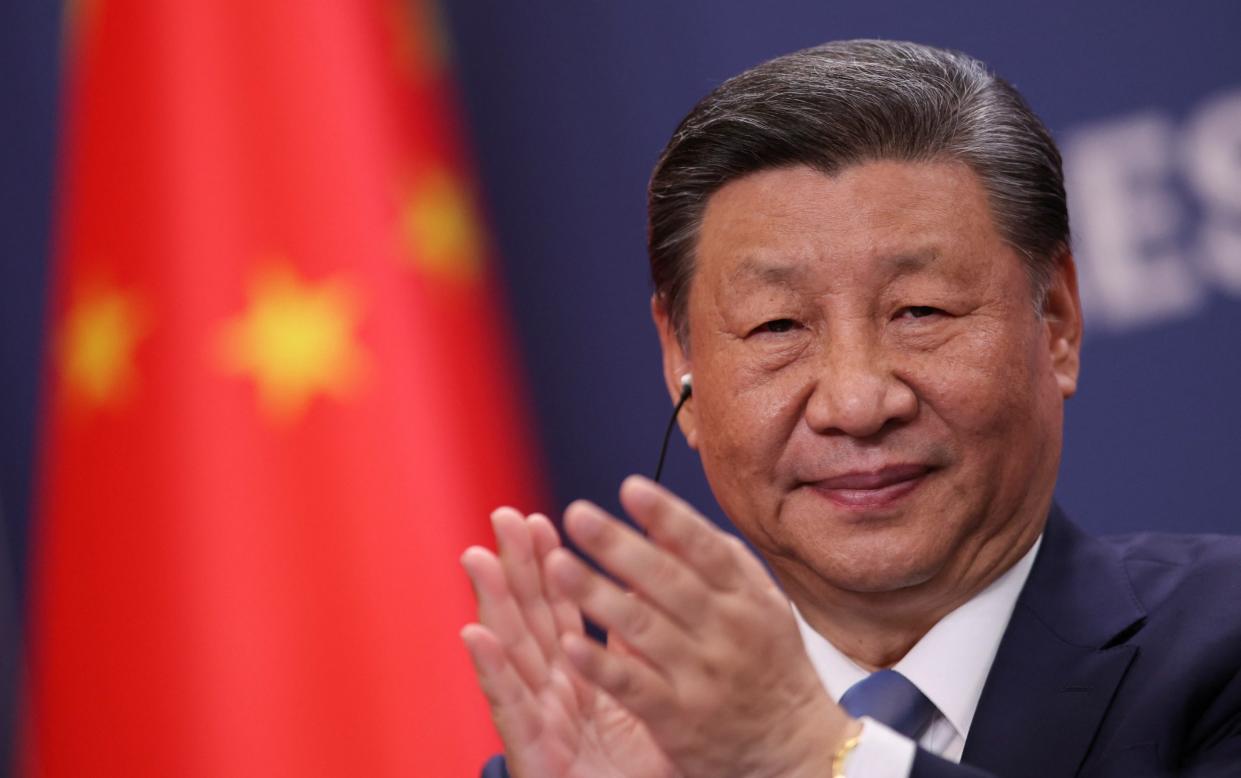China is an enemy of the UK. Why not admit it?

With conflicts raging in Ukraine and Gaza, it is understandable that the Government might be wary about picking a fight with a superpower like China, no matter how incriminating the evidence of its hostile intent might be.
Our military limitations have already been exposed by the demands made by both other conflicts. Maintaining supplies of weapons to Ukraine has severely reduced the stockpiles available to our own military, while our participation in operations against both the Yemeni-based Houthi rebels and Iran has demonstrated the practical limits of Britain’s defence capabilities.
This is especially true with regard to the Royal Navy and its inability to deploy either of its 65,000-tonne aircraft carriers on major combat operations.
This helps to explain why Defence Secretary Grant Shapps, when confronted with damning evidence that Chinese cyber hackers were behind the recent data breach of Ministry of Defence personnel files, preferred to soft pedal as to the true identity of the culprits.
Rather than naming and shaming Beijing’s communist rulers for carrying out what, by any standard, constitutes a direct assault on our national security infrastructure, Shapps simply informed MPs the hack “was the suspected work of a malign actor”. The furthest Shapps was prepared to go in conceding that a hostile regime might be to blame was to admit that “we cannot rule out state involvement”.
With Rishi Sunak using similarly opaque language to describe the perpetrators, ministers seem determined to abide by their “see no evil, hear no evil” approach when responding to overt acts of Chinese aggression. This approach is entirely in keeping with the Government’s declared policy, enshrined in its recent review of national security priorities, that China should be regarded as an “epoch-defining challenge” rather than placing it in the same “hostile state” category reserved for rogue regimes like Vladimir Putin’s Russia.
Putin’s invasion of Ukraine two years ago certainly justifies Whitehall’s conclusion that Moscow constitutes the most acute threat to our national security. He is responsible for the largest conflict Europe has experienced since the Second World War, one that risks the possibility of a direct confrontation with Nato.
By contrast, China is far more cunning in its campaign to undermine its Western rivals, even if its tangible support for Moscow has enabled Russian forces to maintain their offensive in Ukraine. Rather than resorting to crude military force, Beijing prefers to rely on less obvious ploys to target its competitors, such as cyberattacks or encouraging elite educational institutions to propagate a decidedly pro-Beijing narrative.
At a recent discussion at the Oxford Union, for example, on the relative merits of autocracies and democracies, I was deeply alarmed to hear a senior academic inform the undergraduate audience that China was far better equipped to safeguard the living standards and rights of its people than Western democracies. No mention, of course, was made of Beijing’s ruthless repression of its minority Uyghur Muslims.
While the Government might be willing to tolerate Beijing’s insidious infiltration of our academic bodies, the mounting evidence of China’s hostile intent towards the UK and its allies can no longer be discounted.
If, as appears highly likely, China’s elite band of cyber warriors was behind the MoD breach, then the Government has no alternative but to designate Beijing as a hostile regime, irrespective of any impact this might have on Sino-British trade ties.
This would not be, after all, the first time Beijing has been implicated in conducting such attacks. Only in March the Government was obliged to impose sanctions against two Chinese nationals and a Chinese company following accusations that China was responsible for conducting “malicious” cyber campaigns against MPs and the Electoral Commission.
Such activities, moreover, are the tip of the iceberg where Beijing’s state-sponsored attempts to undermine our democracy are concerned.
Last year’s damning 200-page report by the Commons Intelligence and Security Committee, which found that Chinese spy agencies were “prolifically and aggressively” conducting a range of intelligence-gathering activities against the UK, reached the uncomfortable conclusion, for the Government at least, that its response to the Chinese threat was “completely inadequate”.
To this must be added the evidence of Beijing’s complicity in causing the global Covid pandemic. As the Sunday Telegraph reported at the weekend, US intelligence officials were so convinced the virus originated from a Chinese lab that they shared their findings with their Five Eyes intelligence-sharing partners, including Britain. The fact that the British Government then apparently ignored the report says more about its disinclination to view China as a hostile actor than the veracity of the intelligence itself.
Certainly, after the cyberattack on the MoD, it should be clear to anyone involved in drafting British policy on China that the so-called “golden age” once envisaged by David Cameron and George Osborne is not just over. All the evidence increasingly suggests that it never actually existed.


